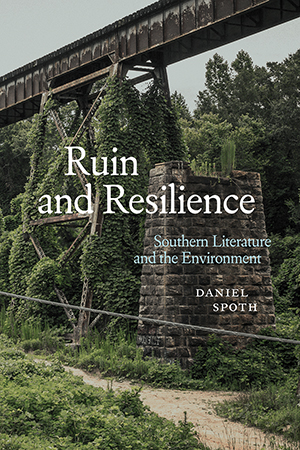
234 pages / 6.00 x 9.00 inches / 10 halftones
Literary Criticism / American - Regional | Literary Criticism / Nature | Social Studies / Regional Studies
In Ruin and Resilience, Daniel Spoth confronts why the environmental stories told about the U.S. South curve inevitably toward distressing plotlines. Examining more than a dozen works of postbellum literature and cinema, Spoth’s analysis winds from John Muir’s walking journey across the war-torn South, through the troubling of southern environmentalism’s modernity by Faulkner and Hurston, past the accounts of its acceleration in Welty and O’Connor, and finally into the present, uncovering how the tragic econarrative is transformed by contemporary food studies, climate fiction, and speculative tales inspired by the region.
Phrased as a reaction to the rising temperatures and swelling sea levels in the South, Ruin and Resilience conceptualizes an environmental, ecocritical ethos for the southern United States that takes account of its fundamentally vulnerable status and navigates the space between its reactionary politics and its ecological failures.
Daniel Spoth is associate professor of literature at Eckerd College in St. Petersburg, Florida. His writing has appeared in ELH, Journal of Ecocriticism, and Mississippi Quarterly, among other publications.
“With Ruin and Resilience, Daniel Spoth is taking ecocriticism south to productive places: road literature, food writing, disaster narrative, science fiction and climate fiction, and the rich archive that is the poetry of Natasha Trethewey. Along the way, he seeks to extricate southern environmental studies from the dead ends of white melancholy and nostalgia—the fetishization of ruin—and to direct it toward the hard-earned resilience exhibited by generations of southerners who have known environmental risk, loss, and injustice firsthand. With this fine study, Spoth maps out a southern ecocriticism for the Anthropocene era.”—Jay Watson, author of William Faulkner and the Faces of Modernity
“Spoth’s readings of a range of southern texts show us that one step beyond (or under) the patina of garden or arcadia or paradise there is its ominous reversal. The metaphor of the U.S. South as a place to escape to is as problematic as it ever was, more so in Spoth’s Anthropocene framework. He is one of a generation of critics warning that it’s time to wake up from the spell of magical thinking.”—Michael Kreyling, author of The South That Wasn’t There: Postsouthern Memory and History
Found an Error? Tell us about it.